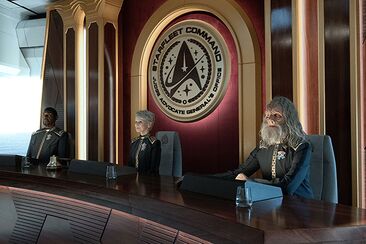Starfleet’s Role in Law Enforcement
More actions

Starfleet’s Role in Law Enforcement is an essential yet often secondary aspect of its broader mission to explore space, protect Federation citizens, and maintain interstellar peace. While Starfleet is primarily known for its scientific, exploratory, and defense missions, it is also tasked with maintaining law and order on its vessels and starbases and in Federation-controlled territories not subject to the jurisdiction of any one member power. The organization’s internal security arm, Starfleet Security, plays a central role in enforcing laws, investigating crimes, and ensuring the safety of personnel and installations. Additionally, Starfleet collaborates with civilian agencies such as Federation Security to uphold justice in non-Starfleet jurisdictions. Specialized divisions within Starfleet, including the Criminal Investigative Division (CID) and the Judge Advocate General’s Corps (JAG), handle more complex investigations and prosecutions. This article explores the structure and function of Starfleet’s law enforcement apparatus, including its unique jurisdictional challenges, collaboration with civilian authorities, and the role of security officers aboard starships and starbases.
Law Enforcement Mandate
Under the Federation Charter, Starfleet holds jurisdiction over law enforcement in areas of space not governed explicitly by any single member world or power. This generally includes vast stretches of interstellar space and Federation-settled systems, where Starfleet serves as the principal authority for maintaining order and enforcing Federation laws. In these regions, Starfleet Security acts as the de facto law enforcement body, tasked with investigating crimes, detaining suspects, and ensuring the safety of Federation citizens and assets—often through Starfleet’s Outpost Corps. Starfleet’s role in these areas is especially crucial in uncharted territories and deep-space sectors, where local civilian law enforcement is often unavailable. This broad jurisdiction allows Starfleet to take action on any crimes or incidents that affect its personnel, ships, or installations, even when traveling far from Federation homeworlds.

However, Starfleet’s authority is not absolute. In systems governed by Federation member worlds, local laws and authorities take precedence, and Starfleet Security must cooperate with civilian law enforcement agencies. Federation planets and colonies are generally responsible for policing their own jurisdictions, and Starfleet steps in only when its personnel or vessels are involved or when requested by local governments. In these cases, Starfleet works closely with Federation Security, a civilian agency that provides law enforcement to non-Starfleet facilities and populations across the Federation. This cooperative dynamic ensures that Starfleet remains focused on its core mission of exploration and defense while still upholding the law in areas where its presence is necessary.
Starfleet’s law enforcement mandate is enacted through the cooperation of multiple divisions, including Starfleet Operations, Starfleet Security, Starfleet Intelligence, the Judge Advocate General’s Corps, and the Outpost Corps.
Starfleet Operations
As the division of Starfleet Command ultimately responsible for the orders given to starship and starbase commanding officers in the field, Starfleet Operations plays an important role in law enforcement in the Federation, by the simple fact that its captains are often the individuals making decisions in the moment when it comes to arresting suspects or allowing them to leave. Once a starship captain has made a decision, this decision is communicated to the local starbase. There, starbase commanding officers make further decisions on how a case will proceed.
Starship Captains

Just as in diplomatic matters, Starfleet captains are granted considerable authority when it comes to matters of law enforcement aboard their vessels and during missions. As commanding officers of starships, captains must often make quick, decisive judgments regarding the enforcement of Starfleet regulations and Federation laws, especially when they are operating far from Federation space and without immediate access to Starfleet Command for guidance. The vastness of space, the distances involved, and the urgency of certain situations demand that captains possess the autonomy to respond effectively to security threats and criminal activities in real-time.
A starship captain’s responsibilities in law enforcement go beyond simply enforcing regulations; they often find themselves acting as investigator, judge, and enforcer in critical moments. When faced with potential violations of Federation law or Starfleet regulations, the ultimate decision to arrest, detain, or release an individual rests with the commanding officer. Captains must weigh a variety of factors before making such decisions, including the safety of the crew, the broader implications for Starfleet’s mission, and Starfleet’s overarching commitment to justice and diplomacy.
This authority is particularly important in situations where a suspect poses a significant threat to the safety of the crew or the integrity of the mission. In such cases, captains must evaluate the risks of arresting or detaining individuals—whether they be crew members, civilians, or even foreign nationals—against the principles of due process and fair treatment. Starfleet captains are trained to handle these responsibilities with careful consideration, always keeping in mind the Federation’s values of peaceful coexistence and fairness.
Captains are also entrusted with the responsibility of ensuring that suspects are treated humanely and in accordance with both Starfleet’s regulations and interstellar law. If a crime is committed aboard a starship, it is the captain’s duty to ensure that a thorough investigation is conducted, often with the assistance of the ship’s Security Division and, in more complex cases, Starfleet’s Criminal Investigative Division (CID). Once a decision is made, it falls on the captain to either refer the case to Federation Security or proceed with Starfleet’s internal disciplinary mechanisms, which may involve the Judge Advocate General’s (JAG) Corps.
Given their diplomatic authority, captains are also expected to exercise great care in situations involving foreign nationals. If a non-Federation individual is involved in a crime, captains must balance the need to uphold Federation law with the potential diplomatic consequences of detaining a foreign citizen. In these cases, captains often consult with Starfleet Command, the Federation Diplomatic Corps, or legal officers, but the immediate decision often rests with them. In more sensitive cases, captains may choose to hand over a foreign suspect to their home government, provided there is an extradition treaty or agreement in place.
In all cases, the decision to arrest a suspect or let them go free must be reported through the chain of command as soon as is practical, generally to the nearest starbase.
Starbase and Sector Commanders

Starbase commanders serve a critical role in Starfleet’s organizational structure, functioning as both operational leaders and law enforcement authorities for the regions surrounding their installations. These commanders are typically senior captains or flag officers, depending on the size and strategic importance of the starbase or sector they oversee. In addition to managing the day-to-day operations of their bases, they have significant authority over security and law enforcement matters within their area of responsibility. This includes not only the starbase itself but also the surrounding sector of space or strategic region under their command.
When criminal matters arise within their jurisdiction, starbase commanders are responsible for initiating judicial proceedings. If the crime involves Starfleet personnel, the commander may convene a court martial with the assistance of the Judge Advocate General’s (JAG) Corps. These proceedings ensure that officers and enlisted personnel accused of crimes are tried according to Starfleet regulations and Federation law. If the crime involves civilians or foreign nationals, however, starbase commanders may instead refer the case to the Federation judiciary system, working in tandem with Federation Security or local authorities.
Unlike starship captains, who often operate independently and must make swift decisions with limited communication, starbase commanders generally have better access to real-time communications with Starfleet Command and the broader Federation legal infrastructure. This means that while they possess considerable authority over minor matters—such as disciplinary actions, security breaches, or minor infractions aboard the station—they are more constrained in major legal decisions, where consultation with Starfleet’s senior leadership or legal experts is required. However, their position as stationary commanders allows for greater oversight and more thorough judicial processes, especially when compared to captains of starships operating on the frontier.
Additionally, starbase commanders play a pivotal role in coordinating sector-wide security. They oversee the deployment of starships and personnel to maintain order in their region, respond to threats such as piracy or smuggling, and ensure that Federation law is upheld across their sector. This broader responsibility often requires collaboration with local law enforcement agencies on Federation member worlds within their jurisdiction, ensuring that both Starfleet regulations and local laws are respected. In certain cases, starbase commanders also act as liaisons with foreign powers when crimes involve extradition treaties or cross-border incidents.
Starfleet Security

Starfleet Security is the branch of Starfleet tasked with safeguarding the safety and well-being of Starfleet personnel, as well as all beings traveling through Federation space. This division is responsible for ensuring the internal security of starships, starbases, and other Starfleet installations, handling everything from day-to-day law enforcement duties to managing external threats. Security officers aboard these vessels or stations are entrusted with maintaining order, investigating crimes, and responding to emergencies, whether that involves detaining a suspect, responding to an act of piracy, or dealing with hostile encounters.
Officers in this division are trained to handle both routine security operations and more complex criminal investigations. The Criminal Investigative Division (CID), a specialist branch within Starfleet Security, plays a critical role in conducting high-level investigations involving serious offenses, such as espionage or violent crimes. Starfleet Security also works in close collaboration with Federation Security, especially when incidents involve civilians or extend beyond Starfleet’s immediate jurisdiction.
Furthermore, Starfleet Security officers are trained to manage these responsibilities with a focus on non-lethal methods, in line with Starfleet’s mission of peace and diplomacy. This reflects the Federation’s values of ensuring safety and justice while minimizing harm, making Starfleet Security a unique law enforcement body that blends security duties with Starfleet’s broader ethos of peaceful coexistence.
Starship and Starbase Security Personnel
Main Article: Security Department Positions

Though all Starfleet officers have the authority to arrest individuals caught in the act of committing a crime, law enforcement responsibilities are primarily carried out by a starship or starbase’s security personnel. Security officers receive specialized training that emphasizes pursuing non-lethal methods of conflict resolution whenever possible. This approach reflects Starfleet’s overarching mission of peace and diplomacy, which extends to its handling of law enforcement. Security personnel are taught to prioritize de-escalation techniques, negotiation, and other non-violent strategies before resorting to force.
Training in non-lethal measures is integral to their preparation, with officers gaining expertise in using equipment such as stun settings on phasers and other subduing technologies designed to incapacitate without causing permanent harm. Additionally, they are trained in hand-to-hand combat techniques that allow them to restrain individuals with minimal injury. Starfleet’s use of force is governed by strict regulations, ensuring that lethal methods are employed only as a last resort, when there is an imminent threat to the lives of the crew or others aboard a ship or station.
In practical situations, whether dealing with crew disputes, criminal behavior, or external threats, Security Division personnel are expected to assess the situation carefully and act in ways that minimize harm. Their ability to effectively de-escalate situations is crucial aboard starships and starbases, where confined spaces and close-quarters living can lead to heightened tensions. Their training prepares them to handle everything from minor infractions to serious crimes, always with the goal of maintaining order while preserving life and upholding Starfleet’s values of peace and cooperation.
Criminal Investigative Division
An arm of Starfleet Security, the Criminal Investigative Division (CID) is a highly specialized branch tasked with investigating serious crimes committed aboard Starfleet vessels or within Starfleet installations. These crimes may include high-level offenses such as espionage, sabotage, homicide, or other breaches of Federation law that demand more attention than routine security matters. CID works in close cooperation with Federation Security, especially when crimes involve civilians or extend beyond Starfleet’s immediate jurisdiction. This collaboration ensures that Starfleet’s law enforcement efforts remain in sync with broader civilian policing authorities across the Federation.
In addition to external partnerships, CID also coordinates with Starfleet’s Internal Affairs division, a branch of Starfleet Intelligence, when investigations involve potential misconduct, corruption, or breaches of protocol by Starfleet personnel. This ensures that criminal investigations maintain integrity, even when they involve high-ranking officers or sensitive matters related to Starfleet operations. Investigations can be initiated either by the division itself, often in response to flagged incidents or intelligence reports, or they can be requested by commanding officers in the field. Commanders have the authority to bring CID in when an incident on their ship or facility exceeds the scope of their security department’s capabilities.
CID’s investigators are highly trained, often with backgrounds in both criminal justice and Starfleet operations, enabling them to handle the complex nature of crimes committed in deep-space environments or on far-flung Starfleet installations. Their expertise includes forensic analysis, intelligence gathering, and legal protocol, allowing them to manage cases that may span multiple jurisdictions or involve sensitive interagency cooperation.
Starfleet Intelligence
Main Article: Starfleet Intelligence

Starfleet Intelligence serves as the Federation’s foremost agency for assessing and analyzing threats posed by external powers. Its primary mission is to gather intelligence on foreign governments, military organizations, and other potential adversaries outside Federation space. This helps Starfleet and Federation leadership make informed decisions regarding security, diplomacy, and defense strategy. However, in addition to its external-facing role, Starfleet Intelligence plays a crucial part in internal law enforcement within Federation space, focusing on two key areas: supporting investigations by tracking subjects of interest and rooting out internal threats like corruption or infiltration.
Firstly, Starfleet Intelligence is heavily involved in tracking subjects of interest within Federation space. This often includes monitoring the activities of individuals or groups that may pose a threat to Federation security, such as suspected spies, smugglers, or those engaged in illegal activities. When such individuals are identified, Starfleet Intelligence works closely with Starfleet Security and Federation Security to provide intelligence that can assist in ongoing criminal investigations. By leveraging advanced surveillance technology, long-range sensors, and encrypted communications intercepts, Starfleet Intelligence can gather critical information that helps law enforcement agencies track, apprehend, and prosecute these subjects. This collaboration ensures that security threats are identified early and dealt with before they can cause significant harm to Starfleet personnel or Federation citizens.
Secondly, internal security is a priority for Starfleet Intelligence, particularly through its Internal Affairs division. This branch is responsible for investigating allegations of misconduct, corruption, and infiltration within Starfleet itself. Internal Affairs is tasked with rooting out double agents, compromised officers, and any personnel who may be acting against Federation interests. In these cases, Starfleet Intelligence uses its extensive resources to conduct covert investigations, often working under conditions of extreme confidentiality to protect the integrity of Starfleet’s operations. The work of Internal Affairs is critical to maintaining trust in Starfleet’s leadership and ensuring that the organization remains free of undue influence from hostile powers.
In both external intelligence gathering and internal law enforcement, Starfleet Intelligence operates with a level of secrecy and sophistication unmatched by other divisions, making it a vital component in safeguarding the Federation from both foreign threats and internal corruption. Through its dual role, Starfleet Intelligence not only informs strategic decisions but also ensures the long-term security and integrity of Starfleet itself.
Judge Advocate General’s Corps
Main Article: Starfleet Judge Advocate General’s Corps

When individuals are arrested by Starfleet, they are typically subject to prosecution by the Judge Advocate General’s (JAG) Corps, Starfleet’s legal division. This process applies not only to Starfleet personnel but also to civilians and other non-Starfleet individuals apprehended aboard Starfleet vessels or installations, or in regions under Starfleet’s jurisdiction. The JAG Corps oversees all legal matters, ensuring that cases are handled in accordance with Federation law and Starfleet regulations. When non-Starfleet personnel are involved, JAG retains jurisdiction if the offense pertains to Starfleet’s interests or occurred within a Starfleet-controlled area, such as aboard a ship or station.
Trials under the JAG Corps follow the Uniform Code of Justice, with judges and legal officers trained in both Federation civil law and Starfleet protocol. Defendants, whether Starfleet officers or civilians, are guaranteed the right to defense, and the JAG Corps is responsible for both prosecution and defense in these cases. This system ensures fairness and impartiality, maintaining the rule of law even in deep-space or frontier regions where civilian courts may not be available. If civilians are involved in crimes unrelated to Starfleet’s immediate interests, however, jurisdiction may be transferred to civilian authorities, such as Federation Security or local planetary governments, depending on the circumstances.
Starfleet Outpost Corps
Main Article: Starfleet Outpost Corps
The Starfleet Outpost Corps, alongside its primary duties of managing minor border outposts and providing logistical support to small colonies, also plays a significant role in law enforcement within these remote regions. As many of the outposts and colonies they serve are situated along the Federation’s borders or in relatively undeveloped territories, there is often little to no presence of civilian law enforcement agencies, such as Federation Security. In these areas, the responsibility for maintaining law and order falls to Outpost Corps personnel, who act as the frontline enforcement of Federation laws and Starfleet regulations.
While their training is less comprehensive than that of the Exploratory Corps, Outpost Corps personnel are well-equipped to handle the basic security needs of these remote locations. Their security training includes managing internal disputes, preventing smuggling, and protecting Federation citizens and assets from external threats like piracy or rogue factions. They serve as the primary security force for these outposts, enforcing both Starfleet’s internal regulations and broader Federation laws, ensuring the safety of those living and working on the fringes of Federation space. Should an arrest be made, Outpost Corps personnel will generally hold the accused until receiving further instructions from Starfleet Security.
In addition to their role in upholding the law, Outpost Corps personnel are trained to de-escalate potential conflicts and maintain peace within their jurisdictions. Since many of the small colonies they support may be vulnerable to external threats or internal conflicts due to their isolation, Outpost Corps members are responsible for providing both physical security and mediation, ensuring that minor disputes do not escalate into larger conflicts.
Relationships with Other Agencies
While Starfleet does have jurisdiction over some matters, cooperation with other agencies and even deference to those agencies is generally preferred, which helps keep Starfleet’s primary mandates of exploration, diplomacy, and defense at the forefront of operational concerns.
Federation Security
Main Article: Federation Security
Federation Security is the primary civilian law enforcement agency of the United Federation of Planets, tasked with investigating and prosecuting crimes that fall outside the jurisdiction of any single Federation member world. This includes offenses that directly violate the Federation Charter, such as treason, espionage, election interference, and other high-level crimes that threaten the Federation’s stability. Additionally, Federation Security takes charge of crimes that occur across multiple member worlds or interstellar jurisdictions. In some cases, individual Federation member governments may request Federation Security’s assistance with particularly complex investigations or those that have broader interplanetary implications.
Though Starfleet is primarily a scientific, exploratory, and defense organization, it plays a supportive role in assisting Federation Security in carrying out its law enforcement responsibilities. Due to Starfleet’s extensive presence in space, including its starships, starbases, and sensor networks, it often provides logistical support to Federation Security agents. Starfleet’s ships can be used to transport agents to distant locations where they are needed for investigations, especially when crimes occur in deep space or along the Federation’s borders. Moreover, Starfleet offers access to its sensor arrays and intelligence-gathering mechanisms, which are essential for monitoring large swaths of space and detecting anomalies or criminal activities. Federation Security relies on this collaboration to gather real-time data on potential threats or active investigations.
In instances where individuals are apprehended by Federation Security, Starfleet often plays a key role in the transportation of detainees, ensuring that those taken into custody can be safely and securely moved to the appropriate facilities for trial or rehabilitation. Federation Security administers the Federation’s system of rehabilitation facilities and colonies, which receive logistical support from Starfleet.
While Starfleet assists Federation Security in various capacities, it generally defers to Federation Security on matters of law enforcement, particularly when civilian populations are involved. Starfleet’s primary mandate remains exploration and defense, and it typically seeks to avoid overstepping into law enforcement unless necessary and clearly within its secondary mandate.
Local Law Enforcement
As a part of the United Federation of Planets, Starfleet operates within a complex framework of legal and jurisdictional boundaries, as the Federation is made up of a voluntary association of independent worlds, each with its own government, legal system, and security apparatus. Because of this, law enforcement is considered primarily a local concern within the Federation, meaning that in most cases, Starfleet personnel must defer to local authorities when a crime occurs within the jurisdiction of a specific member world. Starfleet’s role, in such instances, is largely supportive, stepping in only when necessary or requested.
Most of the Federation’s member worlds, such as Vulcan, Andoria, and Tellar, maintain robust security organizations capable of handling most criminal activities and internal threats. For example, Vulcan has the V’Shar, an advanced and highly respected intelligence and security agency that handles internal security matters on the planet. In such cases, Starfleet’s role is to assist but ultimately defer to these established local forces. If a Starfleet vessel witnesses a crime within a member world’s jurisdiction, its crew is obligated to intervene—especially in life-threatening situations—such as stopping the crime and detaining the suspects, but they would then be required to turn those suspects over to the relevant local security agency for formal arrest and prosecution.
This deference reflects the Federation’s principles of sovereignty and self-governance for its member states, ensuring that Starfleet does not overstep its boundaries by interfering in matters that are within the purview of local governments. However, Starfleet personnel are expected to assist local law enforcement when requested, especially in complex situations where interstellar crime might be involved, such as smuggling, piracy, or espionage that crosses the boundaries of multiple worlds. In such instances, Starfleet may provide intelligence, logistical support, or technical expertise, working in collaboration with local forces to ensure that justice is served.
In cases where Starfleet’s jurisdiction does take precedence—such as offenses involving Starfleet personnel, Starfleet property, or crimes that impact the broader security of the Federation—Starfleet would take the lead in the investigation and prosecution. Even in these cases, however, Starfleet is often required to work alongside local authorities, respecting their laws and customs while enforcing Federation law. Indeed, Starfleet personnel accused of violating local laws are almost invariably turned over immediately to local authorities. This collaborative relationship ensures that the Federation’s diverse member worlds maintain their independence while also benefiting from the resources and expertise that Starfleet can offer in maintaining law and order.
External Law Enforcement

As the Federation is an interstellar political entity that maintains diplomatic relations with numerous neighboring powers, including the Romulan Republic, Klingon Empire, and Ferengi Alliance, there are frequent instances where Starfleet must cooperate with these foreign governments’ law enforcement agencies. This cooperation becomes especially relevant in the enforcement of extradition treaties—formal agreements between the Federation and foreign powers that outline the legal process for the transfer of criminals or suspects between jurisdictions. Such treaties exist to promote interstellar justice, ensuring that individuals who commit crimes cannot evade justice by fleeing into foreign territory.
For example, if a fugitive from Federation space crosses into the territory of another sovereign power, Starfleet must work closely with the relevant foreign law enforcement agency to facilitate their capture and return. In these situations, Starfleet captains are trained to navigate the complexities of interstellar law, which can vary significantly between governments. They must act in accordance with Federation law while respecting the laws and procedures of the foreign power. This often involves careful diplomacy, as the political landscape of interstellar relations can make such cooperation sensitive.
Another area where Starfleet frequently interacts with foreign law enforcement agencies is in the detention of foreign nationals who commit crimes within Federation space. In many cases, when the crime is universally recognized—such as murder or piracy—Starfleet prefers to extradite these individuals to their home governments, allowing them to be prosecuted under their own laws. This practice upholds diplomatic norms and strengthens interstellar cooperation by demonstrating respect for the legal systems of foreign powers.
However, complications arise in situations where Starfleet suspects that a foreign government may not wish to prosecute the individual, or worse, may have sanctioned or supported the criminal activity. In such cases, Starfleet may decide to retain the individual within Federation jurisdiction and refer them to the Federation’s judicial system for trial. This decision is typically made when there is a reasonable concern that justice will not be served in the individual’s home territory, particularly if the crime in question aligns with political or military interests of that government.
Starfleet’s diplomatic and legal officers work closely with the Federation Diplomatic Corps to assess each case, ensuring that extradition agreements are honored when appropriate but also ensuring that the Federation’s principles of justice and fairness are maintained. In these situations, Starfleet captains are empowered to make crucial decisions based on the circumstances, always with the goal of balancing the legal frameworks of multiple interstellar governments while safeguarding Federation interests.
